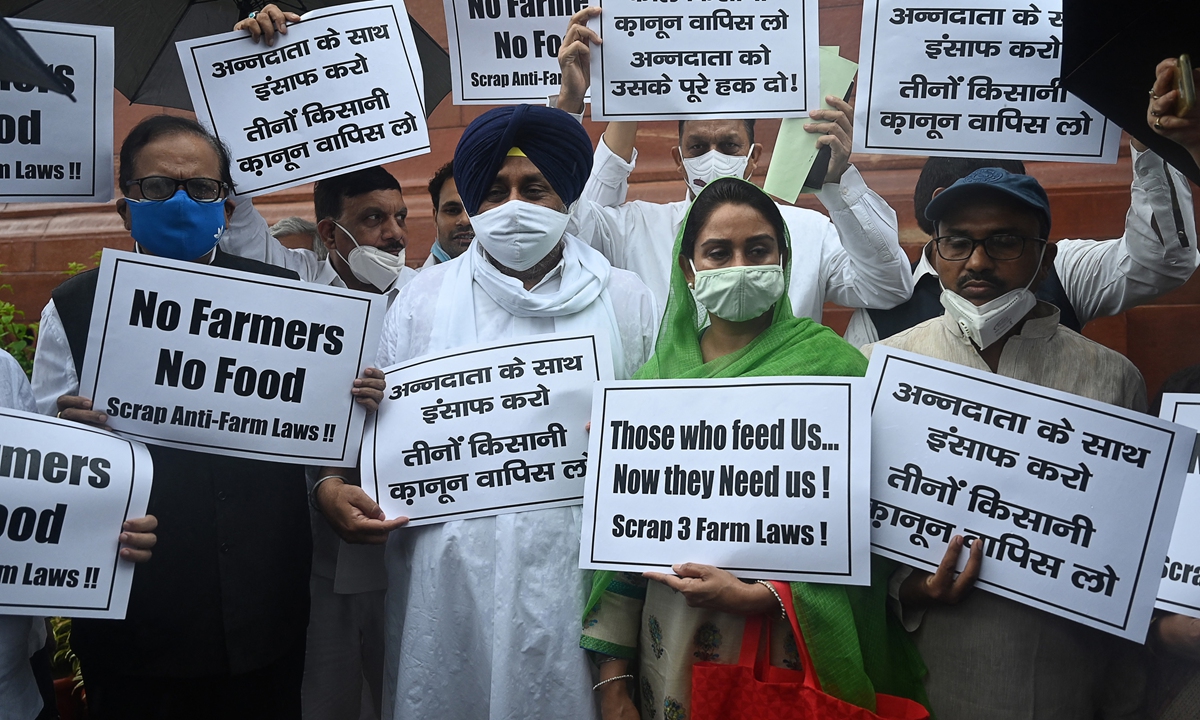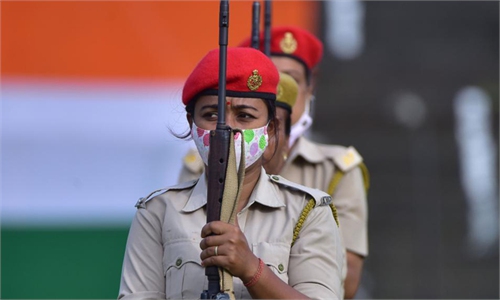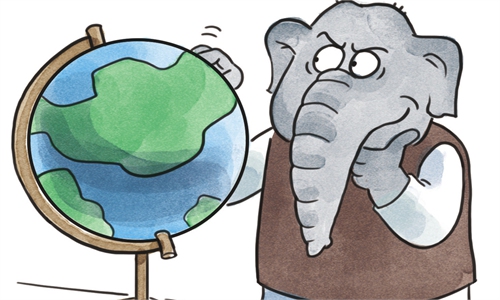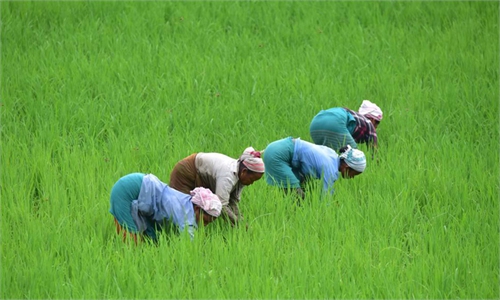
Shiromani Akali Dal (SAD) party president Sukhbir Singh Badal (2L), Harsimrat Kaur Badal (2R) with other leaders hold placards as they protest against the central government?s recent agricultural reforms after arriving for the monsoon session of the Parliament in New Delhi on July 19, 2021. Photo: AFP
India has long praised itself as the largest democracy in the world. It is therefore favored by the US and the West, allowing itself to enjoy a benign environment for development. However, democratic chaos has been repeated in this South Asian country, making it a target of criticism of both Western and Indian scholars.For example, standoffs between oppositions and Indian government had adjourned India's Monsoon Session of Parliament 2021 several times before the session was adjourned indefinitely on August 11. This brought an end to the event two days ahead of the scheduled date of August 13. The standoffs were due to India's ruling Bharatiya Janata Party (BJP)'s rejection to a demand of an investigation into how the spyware program known as Pegasus was used in the country.
This was just an epitome.
In the first place, it is an epitome of eroded constitution and interrupted legislation. In his article entitled "Understanding the Downslide of India's Democracy," Suhas Palshikar, chief editor of the journal Studies in Indian Politics, said "constitutional protections and, more generally, the spirit of the Constitution are easily violated in practice." As a proof, New Delhi has tightened control over Jammu and Kashmir since August 2019; and introduced 2019 Citizenship Amendment Act, which triggered nationwide protests in India.
Milan Vaishnav, a senior fellow and director of the South Asia Program at the Carnegie Endowment for International Peace, wrote in his article "The decay of Indian democracy" that "the central government has involved itself with greater alacrity in domains constitutionally under the jurisdiction of India's states." Vaishnav accused the Modi administration's of "ramming through recent agricultural reform bills without parliamentary debate or consultation with India's states." As a result, farmer protests still continue to this day.
Second, it epitomizes how administration interferes with the judicial system. According to Vaishnav, "Within the central government, power is increasingly concentrated in the prime minister's office at the expense of cabinet ministries. The executive has also come to dominate Parliament, while the judiciary has carefully skirted politically inconvenient cases." Vaishnav continued, "Even the hallowed Election Commission of India—one of the world's most widely respected electoral agencies—has faced credible accusations of deferring to the government's whims."
Third, this demonstrates how India overlooks human rights. A Financial Times article published in July entitled "Spyware revelations are a crucial moment for Indian democracy" went on to note that, "Concerns about New Delhi spying on its citizens are not new."
In addition to Pegasus, Whatsapp also failed to protect Indian users.
It was reported that "India suffered the longest internet shutdowns in 2020 for the second year running globally… affecting 10.3 million users in total." India's internet shutdown of more than four months in Kashmir was the longest ever to be witnessed in a democracy. Meanwhile, it took at least 18 months before high-speed internet was restored in Kashmir in February of 2021.
According to Vaishnav, "Under Modi, the Indian state has repeatedly demonstrated contempt for dissent and sought to paint vocal critics of the government as 'anti-national.' The federal government and numerous state governments have cracked down on academics, activists, and journalists who challenge the powers that be." Meanwhile, "in 2020 itself, 67 journalists faced arrests and/or inquiries, practically turning attacks on media into official policy," wrote Palshikar.
As a result of these factors, India has slipped from the 27th rank in 2014 to 53rd (out of 167 countries) in the latest Democracy Index 2020 released by the Economist Intelligence Unit.
The democratic politics of the West was formulated based on its highly-developed economic foundations. But India's democracy was forcibly implanted. Hence, India has the fatal weakness - discordant economic and political development, which is the root cause for India's deepening contradictions.
From the historical perspective of democracy's development, India is at a turning point in a crisis. Many Indian political elites have clearly perceived that India's nationalist independence movement must be built on the diversity of society and culture. A proper federal system is based on cultural diversity within a federation. India once adopted a centralized federalist form to lay stable socio-political bases. But this has gradually been assaulted since the BJP took office in the 1990s.
Due to historical and political factors, a patronage-democracy has been formed in India. This means that patron-client relations have become an important reason for voters to participate in elections in exchange for interests they need in a highly transactional way. Against such a backdrop, vulnerable groups have been more active in participating in voting. By contrast, rich people and middle-class in cities have seen lower voter turnouts.
Therefore, high voting rates cannot reflect the real level of Indian people's participation in politics. Besides, parliament has thus been misled by the patron-democratic system.
The "democracy card" might be a stepping-stone for India to cater to the US. However, India should be sober-minded if it thinks it can really win Washington's promises to strategically support New Delhi. This is because India's real value for the US is how it can be leverage to deal with China. This has very little to do with India's democratic system. India is clearly interested in US' support for economic development. But this will be a hard climb for India to reach the mountain top—there is a major democratic rift between Indian-style democracy and Western-style democracy.
In fact, in his first phone call with Modi, President Joe Biden said that "a shared commitment to democratic values is the bedrock for the US-India relationship." However, in less than a week after the call, Time magazine published an article entitled "How Long Will Biden Pretend Modi's India Is a Democratic Ally?." This shows the discord between the two democracies.
Just a handful of days before the Biden-Modi phone talk, the US Department of State said "peaceful protests" and "unhindered access to information, including the internet" are "a hall mark of a thriving democracy". This remark was made in response to a question about Indian farmers' protests.
Not surprisingly, Tanvi Madan, the Brookings Institution's India Project director, wrote in January 2021 that, "American observers have lamented that India has not supported democratization or U.S. democracy promotion efforts more actively. Indian observers have bemoaned both American interventionism on grounds of democracy promotion and U.S. support for various authoritarian regimes."
In a few months, the US will hold the first of two Summits for Democracy on December 9 to 12. This will be an important political event of the Democratic Party in accordance to its values-based diplomacy. It is also a new narrative strategy as the idea of a Western camp is losing its global charm. The US wishes to rebuild its leadership to contain China. There will be three key themes of the summit: "defending against authoritarianism"; "addressing and fighting corruption"; and "advancing respect for human rights."
Let's wait and see what will pan out from this. Indeed, all "like-minded" countries, many wonder how the US, the strongest democracy, will perform during this summit. The same holds for how the world's most populous democracy, India, will behave.
The author is executive director of the Institute of South Asian Studies of Sichuan University. opinion@globaltimes.com.cn



